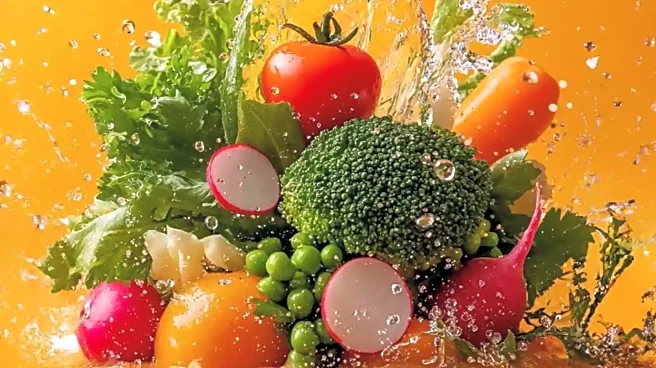What's Happening?
A recent article discusses the importance of hydration and identifies foods that can help individuals who dislike drinking water maintain adequate hydration levels. Gabriela Barreto, a registered dietitian and sports nutritionist, explains that hydration needs vary based on individual factors such as size, activity level, and sweat rate. Barreto suggests that thirst and urine color are indicators of hydration status, with pale yellow urine being ideal. She recommends hydrating foods like watermelon, cucumbers, squash, strawberries, lettuce, and citrus fruits, which are high in water content and essential nutrients. These foods can supplement hydration from liquids and provide electrolytes, aiding in the replenishment of the body's minerals.
Why It's Important?
Hydration is crucial for maintaining overall health, and the article highlights how certain foods can contribute to fluid intake, especially for those who find drinking water unappealing. By incorporating hydrating fruits and vegetables into their diet, individuals can improve their hydration status, which is vital for bodily functions such as temperature regulation, joint lubrication, and nutrient transportation. This approach can benefit people with active lifestyles, those working in hot environments, and anyone seeking to enhance their hydration without relying solely on water consumption. The emphasis on hydrating foods also underscores the importance of a balanced diet in supporting health and wellness.
What's Next?
As awareness of the role of diet in hydration grows, individuals may increasingly seek to incorporate hydrating foods into their daily meals. Nutritionists and health professionals might continue to advocate for dietary strategies that enhance hydration, potentially leading to more research and development of hydration-focused products. Additionally, food and beverage companies could explore opportunities to market products that emphasize hydration benefits, catering to consumers looking for alternatives to plain water.
Beyond the Headlines
The focus on hydrating foods highlights broader dietary trends that prioritize natural and nutrient-rich options. This shift reflects a growing consumer interest in health-conscious eating and the desire for foods that offer functional benefits beyond basic nutrition. The emphasis on hydration through diet also aligns with sustainable practices, as it encourages the consumption of fresh produce, which can be locally sourced and environmentally friendly.









